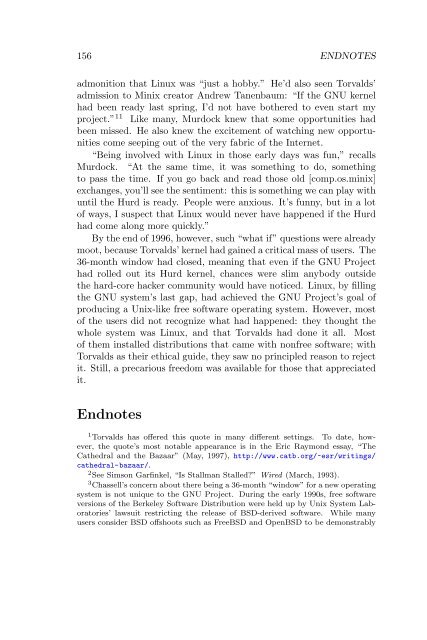You also want an ePaper? Increase the reach of your titles
YUMPU automatically turns print PDFs into web optimized ePapers that Google loves.
156 ENDNOTES<br />
admonition that Linux was “just a hobby.” He’d also seen Torvalds’<br />
admission to Minix creator Andrew Tanenbaum: “If the GNU kernel<br />
had been ready last spring, I’d not have bothered to even start my<br />
project.” 11 Like many, Murdock knew that some opportunities had<br />
been missed. He also knew the excitement of watching new opportunities<br />
come seeping out of the very fabric of the Internet.<br />
“Being involved with Linux in those early days was fun,” recalls<br />
Murdock. “At the same time, it was something to do, something<br />
to pass the time. If you go back and read those old [comp.os.minix]<br />
exchanges, you’ll see the sentiment: this is something we can play with<br />
until the Hurd is ready. People were anxious. It’s funny, but in a lot<br />
of ways, I suspect that Linux would never have happened if the Hurd<br />
had come along more quickly.”<br />
By the end of 1996, however, such “what if” questions were already<br />
moot, because Torvalds’ kernel had gained a critical mass of users. The<br />
36-month window had closed, meaning that even if the GNU Project<br />
had rolled out its Hurd kernel, chances were slim anybody outside<br />
the hard-core hacker community would have noticed. Linux, by filling<br />
the GNU system’s last gap, had achieved the GNU Project’s goal of<br />
producing a Unix-like free software operating system. However, most<br />
of the users did not recognize what had happened: they thought the<br />
whole system was Linux, and that Torvalds had done it all. Most<br />
of them installed distributions that came with nonfree software; with<br />
Torvalds as their ethical guide, they saw no principled reason to reject<br />
it. Still, a precarious freedom was available for those that appreciated<br />
it.<br />
Endnotes<br />
1 Torvalds has offered this quote in many different settings. To date, however,<br />
the quote’s most notable appearance is in the Eric Raymond essay, “The<br />
Cathedral and the Bazaar” (May, 1997), http://www.catb.org/~esr/writings/<br />
cathedral-bazaar/.<br />
2 See Simson Garfinkel, “Is Stallman Stalled?” Wired (March, 1993).<br />
3 Chassell’s concern about there being a 36-month “window” for a new operating<br />
system is not unique to the GNU Project. During the early 1990s, free software<br />
versions of the Berkeley Software Distribution were held up by Unix System Laboratories’<br />
lawsuit restricting the release of BSD-derived software. While many<br />
users consider BSD offshoots such as FreeBSD and OpenBSD to be demonstrably


